To regulate melatonin production, start by disconnecting from digital devices at least an hour before bed to reduce blue light exposure. Create a calming bedroom atmosphere with soft lighting and soothing colors. Manage stress with relaxation techniques like meditation or gentle stretching. Engage in soothing activities such as deep breathing exercises or listening to calming music. Finally, regulate your daily light exposure by soaking up sunlight in the morning and dimming lights in the evening. These evening rituals can set the stage for better sleep, and there's more you can do to enhance your nighttime routine.
Disconnect From Digital Devices
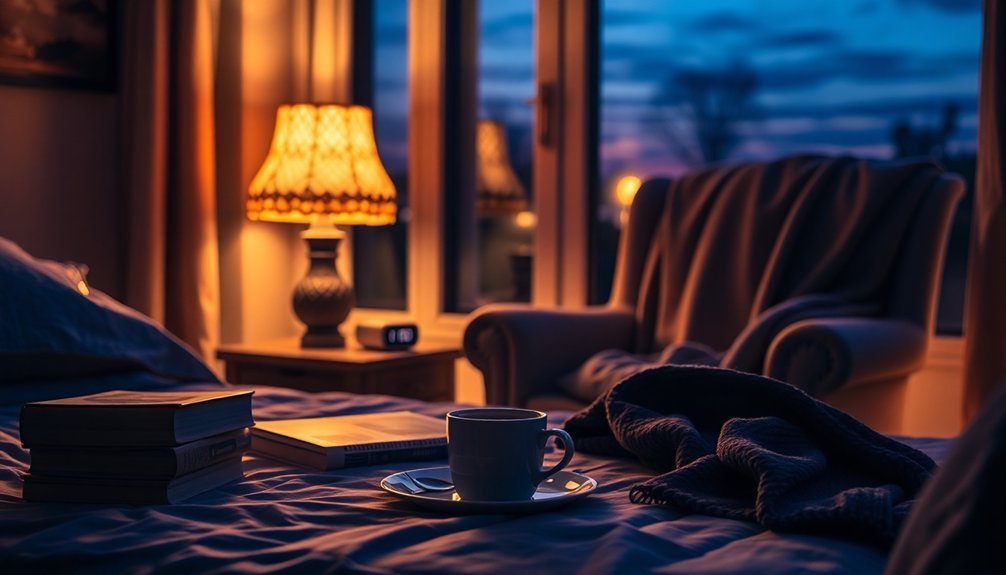
As you prepare for bedtime, disconnecting from digital devices is essential for regulating your melatonin production. The blue light emitted by these devices disrupts your body's natural melatonin levels, making it tougher to fall asleep. The pineal gland, which produces melatonin, gets misled by blue light, delaying its release and affecting your circadian rhythm.
When you use devices before bed, you're not just delaying your sleep; you're also jeopardizing its quality. Engaging with screens stimulates your brain, keeping it active when it should be winding down. Activities like watching videos or answering emails prevent your mind from settling into sleep mode, increasing the time it takes to fall asleep. A technology-free bedroom can promote better sleep hygiene by providing an environment conducive to rest.
To combat this, consider implementing a digital curfew—turning off screens at least an hour before bed can considerably help. You can also use night mode, lower screen brightness, or disconnect devices using specialized apps.
If cutting out screens isn't an option, try reading a physical book instead. This allows your brain to relax without the interference of blue light.
Ultimately, disconnecting from devices is a simple yet effective strategy to improve your sleep quality and overall well-being.
Create a Calming Bedroom Atmosphere
Creating a calming bedroom atmosphere plays a significant role in regulating your melatonin production and enhancing sleep quality. Start by choosing neutral or pastel colors for your walls and decor, avoiding bright or intense hues that energize rather than soothe.
Warm or soft white lighting sets a cozy vibe, so include a reading lamp and dim the lights as you approach bedtime. Additionally, using soft white light can enhance your sense of comfort and relaxation during evening hours.
Maintaining an ideal temperature between 16-18°C (60-65°F) is critical for restful sleep. A cool room allows your body to cool down naturally as you sleep, while a comfortable mattress and soft sheets tailored to your preferences will further enhance your comfort.
Minimize clutter to create an orderly space that promotes tranquility. Incorporate calming plants like Peace Lilies or Lavender, adding natural beauty without overwhelming your senses.
To engage your sense of smell, use aromatic scents like jasmine or vanilla with candles or an essential oil diffuser.
Finally, consider white noise machines to drown out distracting sounds, allowing your bedroom to be a peaceful retreat where your melatonin levels can thrive.
Manage Stress and Anxiety
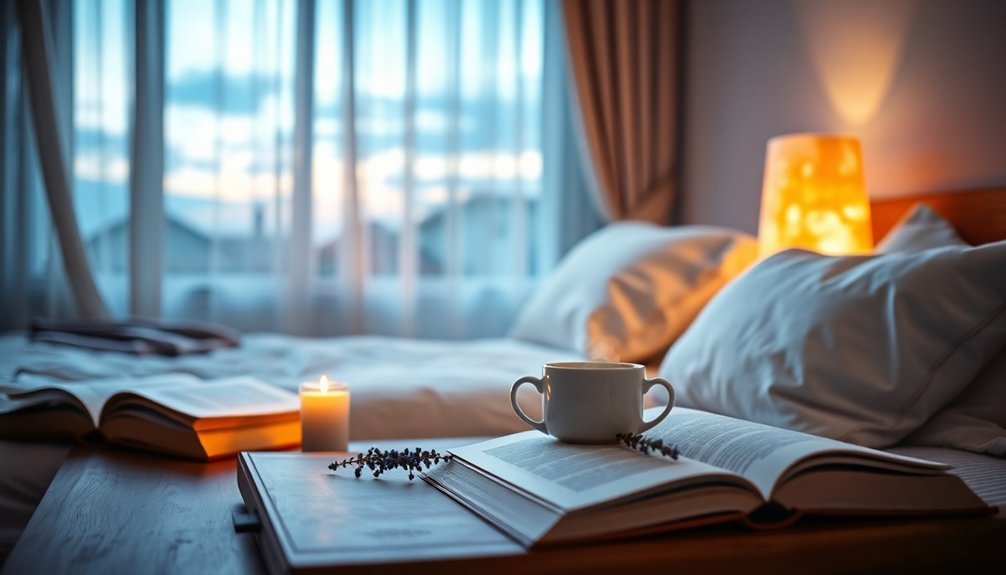
Stress and anxiety can markedly disrupt melatonin production and sleep quality. To manage these feelings, consider incorporating physical relaxation into your evening routine. Taking a warm bath can help soothe your body, especially with Epsom salt or essential oils like lavender added. Gentle stretching or self-massage also releases stagnant energy, preparing you for a restful night.
It's vital to reduce exposure to stimulating activities. Turn off electronic devices at least an hour before bedtime to avoid blue light that can interfere with your circadian rhythm. Set a clear divide between work and personal time, especially if you work from home.
Engaging in mind-calming practices is important as well. Spend 5-30 minutes meditating or using visualization techniques to imagine peaceful places. You might find journaling helpful, as it clears your mind of thoughts before you sleep. Allocating 'worry time' during the day allows you to set anxious thoughts aside for later. Additionally, evening rituals can help ground the soul and cleanse stagnant energies, making it easier to unwind.
Finally, establish a consistent wind-down routine. Sticking to this routine, even on weekends, signals to your body that it's time to relax and enhances melatonin production.
Engage in Soothing Activities
Incorporating soothing activities into your evening routine can greatly enhance your relaxation and support melatonin production.
Start by engaging in deep breathing exercises. Take slow, deep breaths, inhaling through your nose and letting your belly expand. Exhale slowly and repeat, which calms both your body and mind. Gradually increase the duration as you become more comfortable.
Next, consider listening to calming music or ambient sounds. Close your eyes and allow the melodies to distract you from worries. You might also find that pink noise, like rain or ocean waves, improves your sleep quality considerably.
Creating a soothing environment is essential, too. Make your bedroom a sleep oasis by keeping it cool, dark, and quiet. Set the thermostat between 65 to 68 degrees Fahrenheit, turn off noisy electronics, and pull down blackout curtains. An aromatherapy diffuser with your favorite scent can further enhance relaxation.
Finally, include gentle physical activities, like a warm bath or light stretching. These practices help you release tension and prepare your body for a restful night.
Regulate Daily Light Exposure
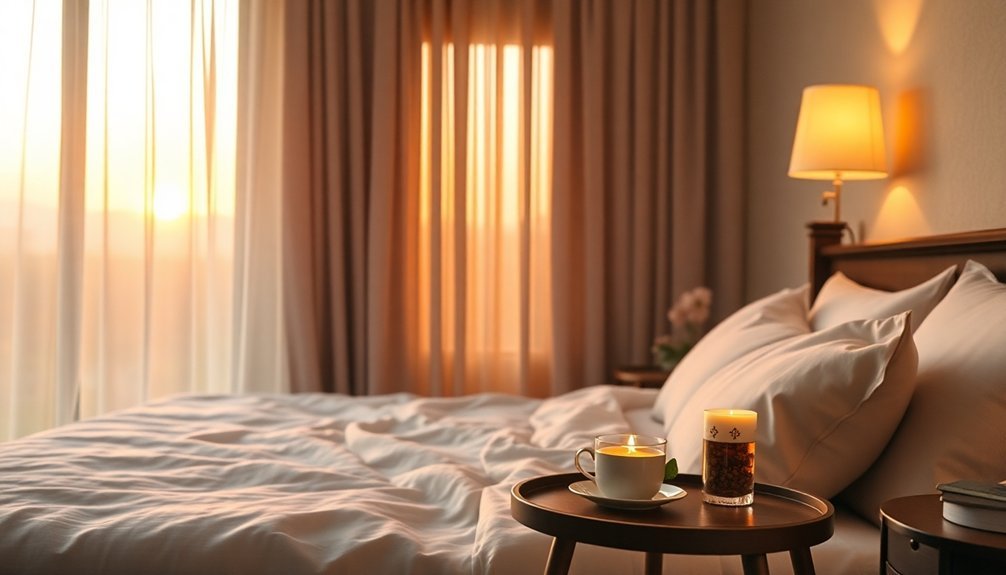
To effectively regulate your melatonin production, it's vital to manage your daily light exposure. Start your day by soaking in some morning sunlight. Just 20 to 30 minutes of natural light helps align your circadian rhythm with the day-night cycle, setting the stage for a healthy melatonin release later on.
In the afternoon, try to spend 5 to 30 minutes outdoors without sunglasses as this helps boost your melatonin rhythm and buffers against evening artificial lights.
It's important to limit your exposure to blue light in the evening, as this greatly suppresses melatonin production. Aim to cut down screen time to one hour before bed and turn off all screens at least two hours before you sleep.
Dimming indoor lights in the evening signals your body to prepare for sleep. Remember, even dim artificial light can disrupt your melatonin production, so consider using warmer lamps or switches that minimize blue light.
Choosing light sources like red light can further reduce melatonin suppression. By carefully managing your light exposure throughout the day, you can enhance your melatonin production and improve your sleep quality.
Frequently Asked Questions
How Does Diet Affect Melatonin Production at Night?
Your diet greatly affects melatonin production at night. Consuming melatonin-rich foods like tart cherries and fatty fish, along with tryptophan sources like oats and bananas, can help enhance your sleep quality and support relaxation.
Can Supplements Improve Melatonin Levels Effectively?
Yes, supplements can effectively improve melatonin levels for many people, particularly those with disrupted sleep patterns. Just remember to consult a healthcare provider first to guarantee they're right for your specific situation.
What Role Does Physical Exercise Play in Sleep Regulation?
Physical exercise plays an essential role in sleep regulation. Engaging in moderate aerobic activities boosts melatonin production, improves sleep quality, and promotes deeper rest. Just remember to time your workouts to avoid disrupting your sleep cycle.
Are There Specific Foods Known to Boost Melatonin?
Yes, specific foods can boost melatonin. Consider enjoying tart cherries, almonds, and fatty fish. Eating oats and bananas may also help. Incorporating these into your diet can support better sleep and enhance melatonin levels.
How Can I Create a Bedtime Routine That Supports Sleep?
To create a bedtime routine that supports sleep, set a consistent sleep schedule, dim the lights, engage in relaxing activities like reading or gentle stretching, and avoid screens an hour before sleeping. Stick to it regularly.
In Summary
By incorporating these evening rituals into your routine, you can effectively regulate your melatonin production and improve your sleep quality. Disconnecting from digital devices, creating a calming bedroom atmosphere, managing stress, engaging in soothing activities, and regulating light exposure all play a crucial role in preparing your body for restful sleep. Embrace these practices, and you'll find your nights becoming more peaceful and rejuvenating, setting the stage for a brighter, more energized tomorrow.



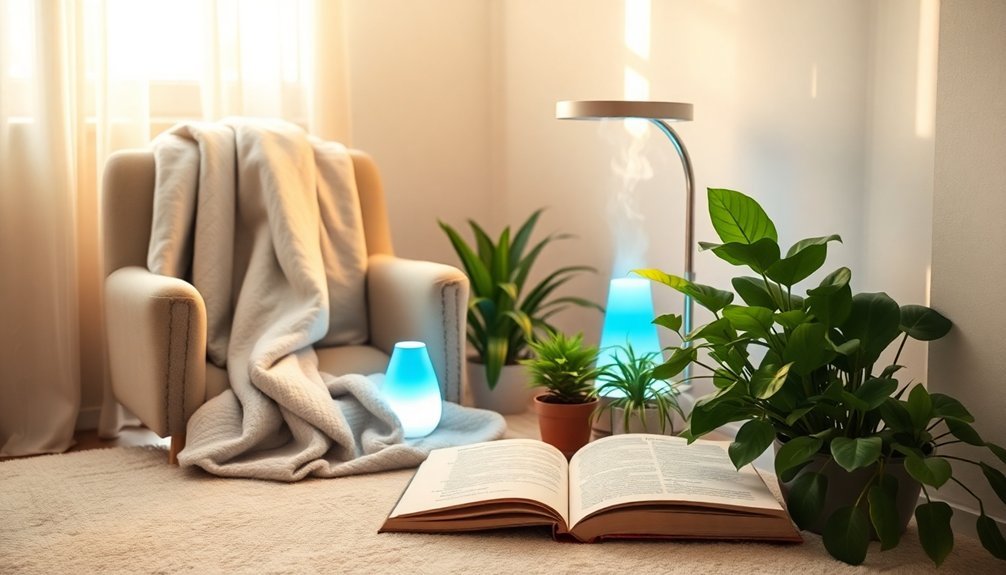
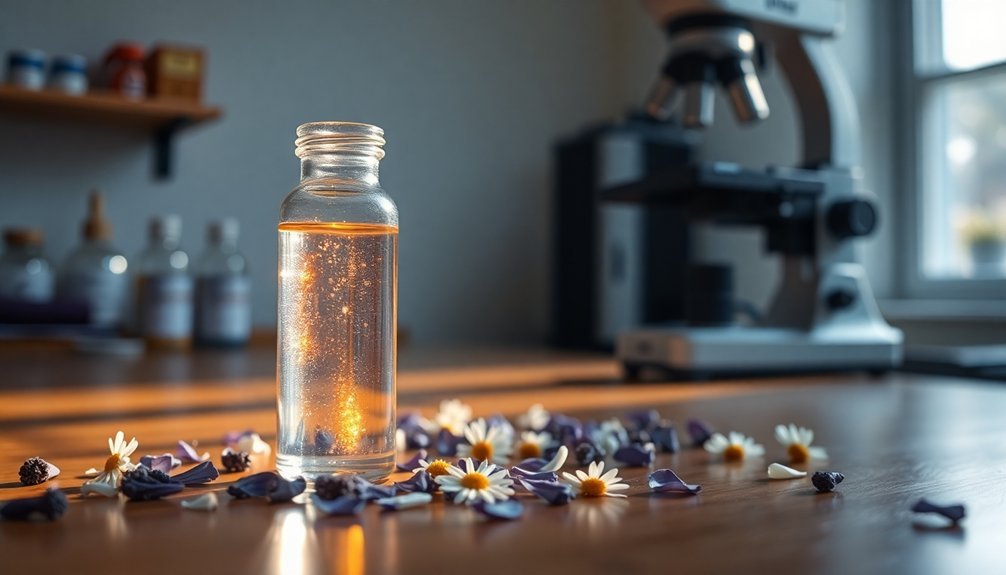
Leave a Reply